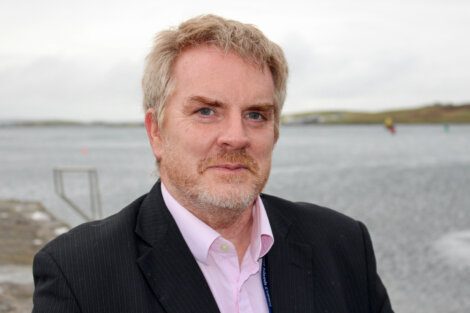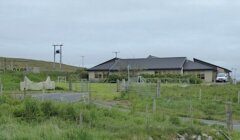Council / SIC financial plan highlights ‘significant challenge’ over next four years
Prioritising activities and warnings about future capital spending are among the key issues
SHETLAND Islands Council’s latest medium-term financial plan is a “stark reminder” that the local authority is not living within its means.
That is the view of finance manager Paul Fraser, who said a failure to address longer term financial sustainability will “effectively mean we will not be in a position to borrow to fund investment in new assets”.
Figures included in the medium term planning for 2023/28 on the face of it look slightly less pessimistic than last year’s version – but there is still a cumulative deficit of £81 million on the horizon if cost pressures are not addressed.
The ‘central scenario’ in the previous medium term financial plan, released in 2022, stood at £106 million.
While the latest financial plan shows an apparent improved position, there is a warning that it is “based on assumptions on external income and reserves which are not sustainable”.
Councillors were told it has this “continued poor position” can be attributed to higher than anticipated pay and price inflation which has weakened the council’s spending power along with a reduction in anticipated income over the same period.
Fraser also had a further warning regarding the difficulties in how the SIC can finance capital spend in the future.
And the Scottish Government’s proposed council tax freeze for the next financial year is “yet to be fully understood”.
Taking everything into account, Fraser said the SIC will again need to consider where it can reduce spending when setting the 2024/25 budget, including by potentially pausing or deferring work or scaling back asset investment.
There is also an acknowledgement that amid a high level of vacancies services may have to be redesigned to reflect current staffing levels.
The 2023-28 medium term financial plan was approved by the full council on Tuesday.
Become a member of Shetland News
But some elected members expressed concern about the pace of change.
Shetland Central member Moraig Lyall said in her four years as a councillor the message has remained the same – that the SIC is spending beyond its means.
“We really need to moving from that position…to ‘this is how we’re going to get where we need to be’,” she said.
She called for progress on forming a plan on tackling the issue.
The medium term financial plan painted a picture of tightening public finance as governments look to “rebalance” after the Covid pandemic and subsequent economic troubles.
The plan says funding for local government in Scotland is expected to remain flat in cash terms between 2022/23 and 2025/26, before “modestly increasing by £100m in 2026/27”.
The ‘central’ scenario presented in the plan, of a cumulative £81.3 million deficit for the SIC by 2027/28 if financial pressures are not addressed, is described as the “mid-case” and the most likely outcome.
An optimistic scenario places that figure at £30.8 million, with the pessimistic outlook sitting at a potential deficit of £135.4 million.
Fraser’s report said: “This plan clearly illustrates the council faces a significant challenge over the next four years, even if the circumstances upon which the upside scenario is based transpire in the next four years.
“The council will need to take action to address the forecast deficits that this plan anticipates.
“The need to take action to address the council’s financial unsustainability is now becoming more pressing as the council seeks to proceed with a range of investments in services and infrastructure.”
For the next financial year at this stage there is an estimated funding gap of £37 million before income from the SIC’s harbour interests (£18 million) and investment returns (£15 million) are taken into account.
Once those are taken into account, it would then result in an “unsustainable draw” from reserves of £3.7 million.
Fraser also highlighted the there is a difficulty around capital projects due to the need to comply with a ‘prudential code’ which determines how much the SIC can borrow.
The report said there is “very limited headroom” to increase its borrowing.
It continued: “More importantly however, the prudential code requires authorities to demonstrate that capital expenditure plans are prudent, affordable and sustainable.
“It will be difficult to satisfy those requirements of the prudential code and substantially increase borrowing given the council’s issue of financial sustainability, as demonstrated by this plan.
“The council’s reserves present an alternative source of funding that could be utilised to finance capital expenditure instead of borrowing.
“However, the use of reserves in this way would result in lower levels of investment returns available to supplement the council’s future revenue and capital budgets, therefore creating pressure for services to accommodate what could be significant reductions in available funding.”
Regarding staffing, Fraser said the high level of vacancies is good from a financial position but not on a service level.
Councillors were told that with services designed for a larger workforce, this is putting pressure on existing staff.
Chief executive Maggie Sandison also said the staff headcount is likely to decrease in the coming years as more people are set to leave than join the local authority.
But Fraser noted that while there continues to be a large number of vacancies, the cost of delivering services has increased.
The medium term financial plan also includes a list of objectives, including development a five year plan for harbour income, and work on a forecast for wider oil and gas related income.
Another objective is to carry out more in depth reviews of charging to agree a position whereby fees cover costs.
During debate leader Emma Macdonald said while the plan had an improved financial forecast, “we are not out of the woods” with significant risks still present.
She said there was an opportunity in the next budget setting to help to sustain services.
Macdonald added that local government is about providing valued services to the community – “it’s not exciting, it’s not glamorous, but it’s really important”.
Lerwick South member John Fraser, who advocated prevention over the cure – disagreed with the lack of excitement – saying it was indeed exciting that the council is in a position to support the most vulnerable.
Lyall received support for her desire to see progress on tackling the financial issues, with ward colleague Davie Sandison stressing the need to focus on workforce challenges, supporting the council ‘growing its own’ staff.
Lerwick South member Dennis Leask, who chairs the development committee, said he was frustrated at a lack of progress.
“If we don’t control time, it will control us,” he warned.
“There’s several projects sitting in development that’s waiting on advice. We’ve got to make better progress.”
But Macdonald said there was a need for realism when it came to timescales, and spoke up for the process behind making big change.
“We really need to look at the areas that have those really significant costs, and the real lack of workforce, and we have to redesign those services,” she said.
However Leask said it was a medium term plan not the “long long term”.
“We’ve got to show some more ambition if we’re going to make this happen,” he said.
Meanwhile Lerwick North and Bressay councillor Stephen Leask supported a “root and branch” review of services – adding that some of his colleagues would need “magic money trees” to see some of their ambitions realised.
On the topic of members’ aspirations, Shetland South councillor Allison Duncan said his only comment was “seeing is believing”.
North Isles member Robert Thomson had earlier spoke up for the idea of fixed links as ferry replacements, saying they would bring positive change in a number of areas such as freeing up labour and allowing people to move around more easily.
Become a member of Shetland News
Shetland News is asking its many readers to consider paying for membership to get additional features and services: -
- Remove non-local ads;
- Bookmark posts to read later;
- Exclusive curated weekly newsletter;
- Hide membership messages;
- Comments open for discussion.
If you appreciate what we do and feel strongly about impartial local journalism, then please become a member of Shetland News by either making a single payment, or setting up a monthly, quarterly or yearly subscription.

















































































